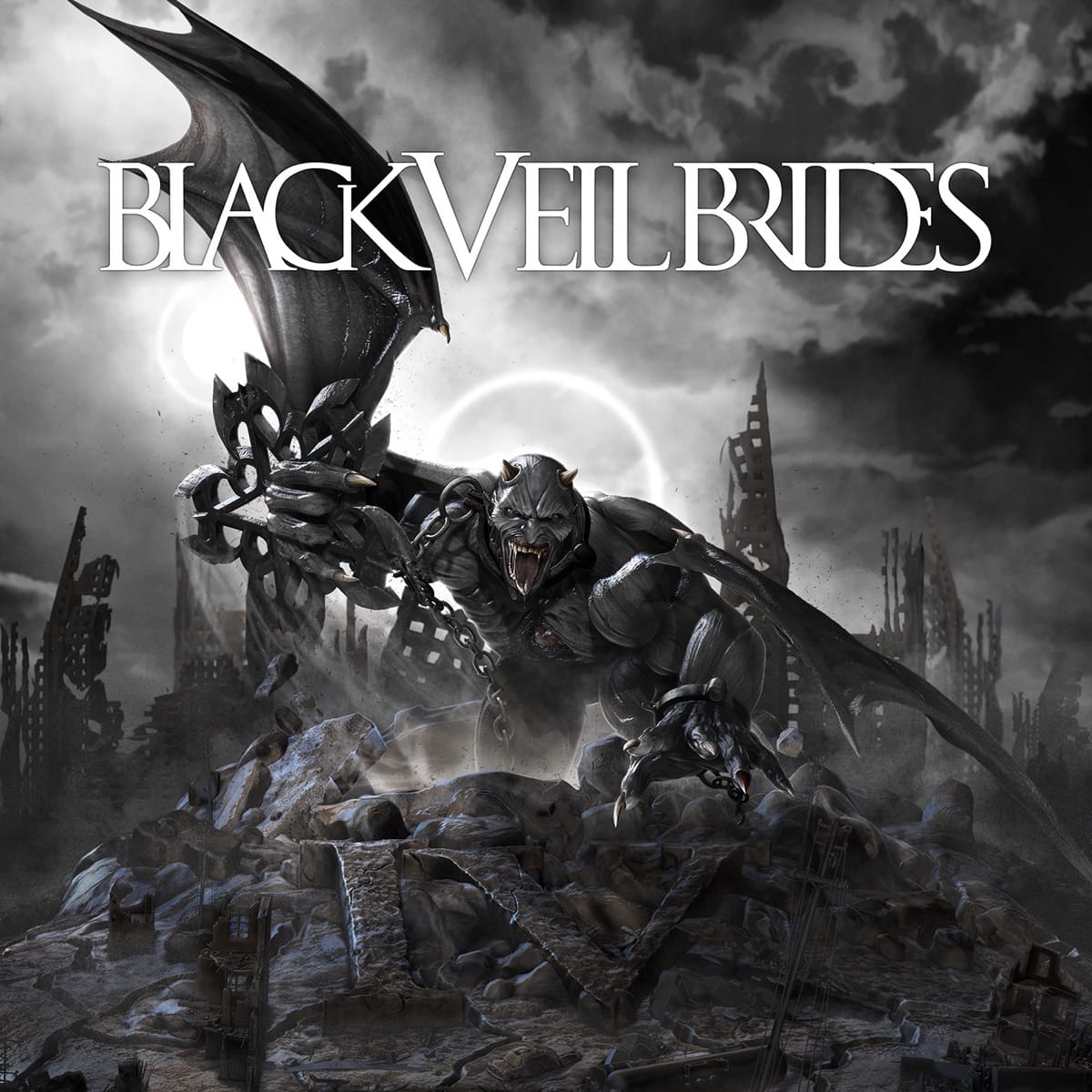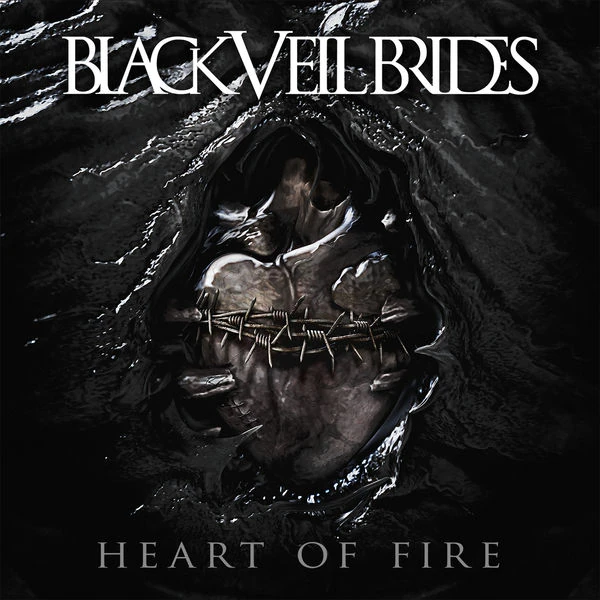Black Veil Brides' Self-Titled Album, Ten Years Later
After a decade, it's clear to see how the band's most rock-spirited release marked the beginning of a memorable and successful new chapter for Black Veil Brides

2014 was an interesting year to be a Black Veil Brides fan – coming off the heels of their most commercially successful album, the ambitious 2013 concept album Wretched and Divine: The Story of the Wild Ones, featuring the mega-hit single “In the End,” along with the album's short-film companion, Legion of the Black, and consistent touring across the United States and Europe (including the band's first main stage slot on the Vans Warped Tour), it felt as though Black Veil Brides was on top of the world. Frontman Andy Biersack was on more magazine covers than most bands have albums in their discographies, and the fan-base was quantifiably at an all-time high, desperately awaiting the band's next move.
However, no successful period of time comes without its tribulations. As great as things may have looked on the outside looking in, this was a tumultuous time inside of the band — some members felt left out of the recording process of Wretched and Divine, with drummer Christian “CC” Coma admitting that he didn't feel much of his presence on the album in comparison to previous studio efforts. Tensions also arose due to lack of communication, with some people in the band distancing themselves from others, and it led to an overall unenjoyable feeling and low morale for the group. Additionally, Biersack’s physical and mental health was not in the best condition at the time – most of the shows on the European leg of the 2013 “Church of the Wild Ones” Tour (along with 3 US dates in the fall) had to be rescheduled to the fall due to Biersack contracting an unfaltering type B flu virus, and his drinking habit was at its worst. Also, while the fanbase was at its height, there were a fair amount of detractors as well. Granted, Black Veil Brides has always gotten unfair disparagement from the masses, but with the added commercial success and mainstream crossover appeal of the Wretched and Divine record, it can be inferred that just as the amount of adulation that came their way reached a new level during that album cycle, so did the amount of denigration, especially when you look at all the different videos of Biersack getting into verbal altercations with audience members during Warped Tour that year.
When it came time for Black Veil Brides to enter the studio for their fourth album, the band collaborated with renowned producer Bob Rock, namely known for producing Mötley Crüe’s blockbuster Dr. Feelgood album and the divisively iconic Black Album by Metallica. Having also mixed and engineered other legendary records like Bon Jovi’s Slippery When Wet and Loverboy’s Get Lucky, the behind-the-scenes specialist had plenty of experience and resources at his disposal to assist the band in achieving whatever sound they happened to be going for.
In his autobiography, They Don’t Need to Understand: Stories of Hope, Fear, Family, Life and Never Giving In, Biersack stated that during the pre-production of what would become Black Veil Brides’ self-titled album, he had obsessed over trying to find the “story” of the album, much like how he made Wretched and Divine, often asking himself, “when will I come up with something great? What is it that I’m trying to achieve here?” Whether or not he feels like he achieved something great with the album, I’d argue that this was the exact record that needed to be made at this point in the band’s career, and still contains some very strong material.
Given Bob Rock’s track record, the end result of his collaboration with Black Veil Brides ended up being the band’s most “old-school” sounding records to date, perfectly paying homage to their predecessors while maintaining their modern sensibilities. The Black Album was a big source of inspiration for the band at the time, to the point where they wrote and recorded in the same locations, used the same equipment, and even utilized the same vocal warmups as Metallica. Of course, Black Veil Brides didn’t recreate the sound and composition of The Black Album, but it’s that same kind of straightforward hard rock energy that can be felt throughout the album. Given the obvious arena-rock inspirations that the band has had since the beginning of their career, that side of their sound was dialed up even more in the presence of Bob Rock – so much so, in fact, that Rock brought in some of the backup vocalists from albums like Dr. Feelgood to help with gang vocals and additional background harmonies for Black Veil Brides. Biersack also recorded his vocals in a live room instead of an isolation booth, further adding to the raw rock and roll sound of the record — in an interview with Alternative Press at the time, Biersack said that he recorded with “a big PA setup with playback blasting at me. I sang holding the mic in my hand, foot on a monitor. All of the vocals were done like that and they sound better than on any other record we’ve done, because there’s personality and vibe to it.”
Back when bands only released two songs instead of half the album as singles before a release, the ones for Black Veil Brides’ self-titled fourth record ironically ended up being the opening two tracks of the album. Emphatically kicking things off with the energetic “Heart of Fire,” the song sets the tone with its familiar riffs that fans have come to expect from a Black Veil Brides track, along with a huge chorus that’s amplified by its gang vocals and background harmonies. “Faithless” is a heavier song, and one that’s proved to be a great opening for their live shows over the years. CC’s double-bass drumming is on full display here, along with the guitar duo of Jinxx and Jake Pitts. Up next is “Devil in the Mirror,” a faster-paced song than the previous one and very reminiscent of the band’s sound and lyrical content from the 2011 Set the World on Fire album cycle, but with more of a classic hard rock production quality.

My favorite three-track run on the album is actually the following three songs, not only because of their catchiness, but for their musical diversity amongst each other. The opening 35 seconds of “Goodbye Agony” was enough to hook me in, but the fact that the song builds up into so much more is even better – the drums hit hard enough at the right times to still not overpower the rest of the instrumentation, the guitar harmonies work so well together, and Biersack’s vocals perfectly convey the message of the song without dramatically over-performing, which can be expected in any rock ballad. “World of Sacrifice” is another high-energy old-school BVB track, complete with uplifting lyrics and a patented sustained Biersack scream in the opening seconds. Following that is “Last Rites,” an 80s hard rock inspired banger that feels like a spiritual mix between Alice Cooper’s “Hurricane Years” and Kiss’ “Hide Your Heart,” with a touch of that Black Veil Brides heaviness.
Black Veil Brides have always written songs that revolt against their doubters and skeptics, but perhaps none as pointedly as “Stolen Omen” – while there’s a clear message of blind faith in the religious sector that’s implied with the lyrics, there’s also a way to interpret it in the context of the band’s haters and how they impulsively cling to a message without any thinking of their own. Whether or not that was the intention with the lyrics, that was the way I interpreted it.
On Wretched and Divine, a highlight of the album was the soaring ballad “Lost It All,” and the overall sonic grandeur of that song was replicated on Black Veil Brides in the form of “Walk Away.” With several key changes and guitar solos, this is one of those songs that’s epic and grandiose in every sense of the word, and one that I unfortunately didn’t appreciate enough when the album first came out.
Wasting no time, the record picks up immediately with “Drag Me to the Grave,” an upbeat arena-rock anthem with a chorus that most arena rock acts of the 80s could only wish for. From the gang vocals in the intro to the transitory guitar licks between the chorus and the verses, this track is one of the more energetic cuts on the album that stays in the listener’s head once it makes its way there. After that, “The Shattered God” takes a hard-hitting turn both musically and lyrically – with heavier guitars and harder drums, Biersack sings about an egocentric person that attempts to control other people, only for them to lose everything themselves in the end. A musical highlight is the guitar solo that fades into the end of the song – I can’t count how many times I’ve had my ears blown out trying to hear the entirety of the solo as it fades out, only to be boomingly welcomed by the opening strums of “Crown of Thorns.” The album’s closing track features a melody that was written between the album cycles of Set the World on Fire and Wretched and Divine, but wasn’t utilized until the making of this self-titled release. It’s easy to hear the musical and lyrical similarities from their second album as far as certain themes and motifs go, but there’s also a clear evolution and adjustment period that took place to have it fit the sonic identity of this album, and it works extremely well, especially as an album closer.
The Best Buy version of the album had a bonus track, “Sons of Night,” which actually ended up being one of my favorite songs on the album. While Biersack himself admits to not really knowing the exact meaning of the lyrics and feeling like it was partially incomplete, it always resonated with me on a musical level for some reason. As a band kid at the time, there were many nights that I spent on the bus coming back from marching band competitions or away football games listening to that song on repeat while I was in high school.
In general, this self-titled album has a lot of significance to me as a fan. Having gotten into Black Veil Brides in mid-2013, shortly after the release of Wretched and Divine, this was the first album cycle from the band that I was able to anticipate and actually watch unfold. Much like with Motionless in White’s Reincarnate album, which was released a month and a half earlier, it left a big impression on me in that respect – songs like “World of Sacrifice,” “Last Rites,” and “Heart of Fire” are still on constant repeat for me, and it’ll never cease to amaze me how little this album is represented in their live setlists. Granted, there are several songs of theirs that deserve more live recognition, but given the time constraints that come with some of their tours, especially as support acts, one can only hope that their favorite deep cuts will get their time in the spotlight one day.
I may have written about this in my top 5 Black Veil Brides songs writeup during the first leg of the “Trinity of Terror” Tour, but Black Veil Brides was the band that bridged the gap for me between the classic and 80s hard rock I was raised on to the music of my generation – growing up, I worshiped the legends like Rush, Alice Cooper, Iron Maiden, and Blue Öyster Cult, and music from that time was all I listened to for quite a while. I discovered Black Veil Brides in 2013 by hearing a family friend talk about them, and while I was vaguely familiar with the chorus to “In the End,” the first full song I heard from them was “Coffin,” and that was enough to convince me that I found the next big thing in music. Little did I know just how big they already were at the time – regardless, getting into them made me want to find even more newer bands, and to get familiar with the new wave of genre talent, which led me to some of my other all-time favorites like Motionless in White and Ice Nine Kills.
Personally, I never understood the hate that Black Veil Brides got, especially from the older generation of rock fans – the same people that lived off of the same twenty or so songs on classic rock radio and complaining that there were no new bands anymore never even bothered to give the band a chance or take them seriously just due to the fact that they were young and new, an oxymoronic assertion if I’ve ever heard one. It always baffled me how none of them seemed to notice the fact that Black Veil Brides was the new band they’ve been waiting for the whole time – Andy Biersack is a rock star in every sense of the word as a frontman, CC is an insane drummer with an equally thunderous onstage persona, and Jake Pitts and Jinxx are one of the best guitar duos in all of modern rock. Their aesthetic is a clear nod to the Mötley Crües and Twisted Sisters of the rock world, and their music was a modern take on that style, as well as taking inspiration from the punk groups like Social Distortion and AFI. I was always the first to come to their defense whenever I’d hear someone say something ignorant about them, to the point that I would show their music to people without telling people it was BVB and hear them say they enjoyed it, only to call their stupidity out when they instantly backtracked their compliments when they found out who wrote the music they just admitted to enjoying. There have always been bands that are popular to dislike, but it always annoyed me when people did so without even hearing the material themselves and instead just tried to fit in with the popular hive mind. When this album was released, I always used it as an example for people looking for new rock music because of how much of that old-school energy is mixed in with the band’s modern sound. Much like how their previous work bridged the gap for me to want to check out more newer bands at the time, I felt that this release could have been that catalyst for many other people, particularly those in the older age brackets, because it had a sound and atmosphere that may have been easier for them to resonate with than the band's earlier material.
Regardless, ten years after the release of their self-titled album, Black Veil Brides is in a fantastic place now, both musically and personally, as it appears from the outside looking in at least – shortly after the release of the album, Biersack got sober (and his voice has sounded better than ever on the last couple records, but that’s a different conversation for a different day), the band released their first live DVD Alive and Burning, and they continued to make even better albums than their previous outings, including 2018’s Vale (which will likely get a 10-year anniversary write-up when the time comes as well, because that album also packed quite a punch for me), and 2021’s The Phantom Tomorrow. The addition of Lonny Eagleton on bass seemed to breathe a whole new life into the band, which was evident with the sonic nature of the band’s first single with him, “Saints of the Blood.” They continue to pack out venues on successful tours, and their latest single, the Sweeney Todd-themed “Bleeders,” from the EP of the same name, continues to dominate rock radio. While Wretched and Divine was their magnum opus in a sense, it also could’ve been the end of Black Veil Brides – with the collaborative process that went into making this self-titled record after the turmoil of the previous album cycle, both in the studio and on the road, I feel as if this was truly the beginning of a new era for the band. Yes, there are many ways to compartmentalize their career, but the way I see it, perhaps partially biased but regardless, this was a new beginning for the band, and it truly set them on the path to where they are now.
As previously stated, Black Veil Brides’ self-titled album is one that means a lot to me personally as a longtime fan of the band, and I can’t sing its praises enough. Even as a fan for over ten years now, I’ve only been able to see them live once, which took place in Myrtle Beach on the first leg of the “Trinity of Terror” Tour in April 2022, but I’m hoping there will be a time in the future in which I’ll be able to see them as a proper headliner soon. The “Bleeders” Tour this past spring looked amazing and had one of their best supporting lineups in the history of their touring career, so I’m keeping my fingers crossed for a bill like that again in the near future. Until then, their albums will stay on repeat, and I look forward to finding another opportunity to write about them again.

To keep up with Black Veil Brides, you can buy their merch here and keep up with their tour dates here.
Thanks for reading! If you liked this article and want to keep up with more from me, feel free to subscribe

